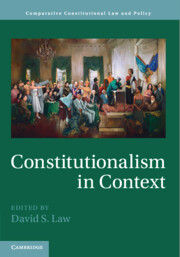Book contents
- Reviews
- Constitutionalism in Context
- Comparative Constitutional Law and Policy
- Constitutionalism in Context
- Copyright page
- Dedication
- Contents by Topic
- Contents by Region
- Figures
- Tables
- Contributors
- User’s Guide and Preface
- Abbreviations
- I Introduction to the Field
- II Concepts and Definitions
- III Constitutional Drafting and Revision
- IV Constitutional Adjudication and Interpretation
- V Rights
- VI Structure
- 17 Subnational Constitutionalism: Hong Kong
- 18 Electoral Systems: Indonesia
- 19 Fourth-Branch Institutions: South Africa
- VII Challenges to Liberal Democratic Constitutionalism
- Index
- References
19 - Fourth-Branch Institutions: South Africa
from VI - Structure
Published online by Cambridge University Press: 17 February 2022
- Reviews
- Constitutionalism in Context
- Comparative Constitutional Law and Policy
- Constitutionalism in Context
- Copyright page
- Dedication
- Contents by Topic
- Contents by Region
- Figures
- Tables
- Contributors
- User’s Guide and Preface
- Abbreviations
- I Introduction to the Field
- II Concepts and Definitions
- III Constitutional Drafting and Revision
- IV Constitutional Adjudication and Interpretation
- V Rights
- VI Structure
- 17 Subnational Constitutionalism: Hong Kong
- 18 Electoral Systems: Indonesia
- 19 Fourth-Branch Institutions: South Africa
- VII Challenges to Liberal Democratic Constitutionalism
- Index
- References
Summary
Scholars are increasingly taking note of a species of government institutions that fall outside the traditional separation of powers and have come to be known as the “fourth branch”: these institutions are created by constitutional design to engage in independent oversight and investigation of the other branches. Using South Africa as a case study of “fourth branch” institutions, this chapter dives deeply into the South African cases on corruption (such as the Scorpions litigation, set in its political background) before turning to the more general theme of Chapter 9 institutions in South Africa, then surveying the rise of the furth branch in constitutional systems around the world. The chapter concludes by evaluating both the value and the limits of the “deep dive” case study approach to understanding topics in constitutional design.
Keywords
- Type
- Chapter
- Information
- Constitutionalism in Context , pp. 426 - 446Publisher: Cambridge University PressPrint publication year: 2022

